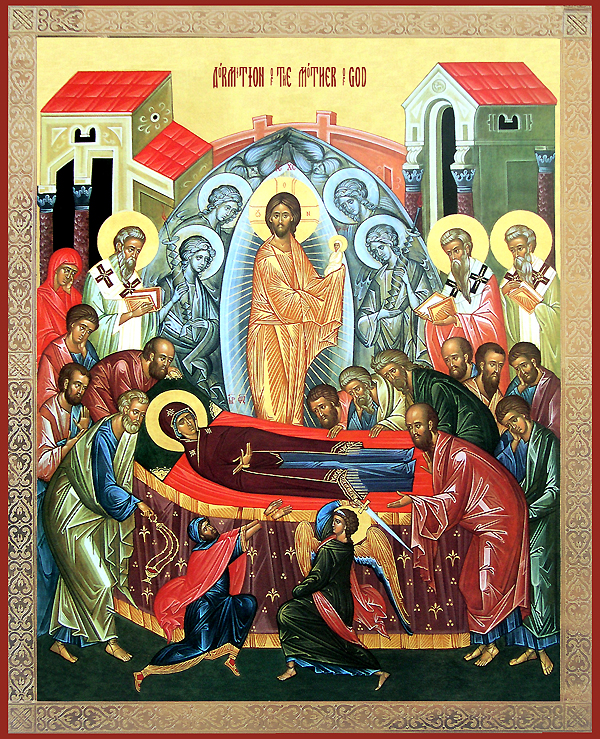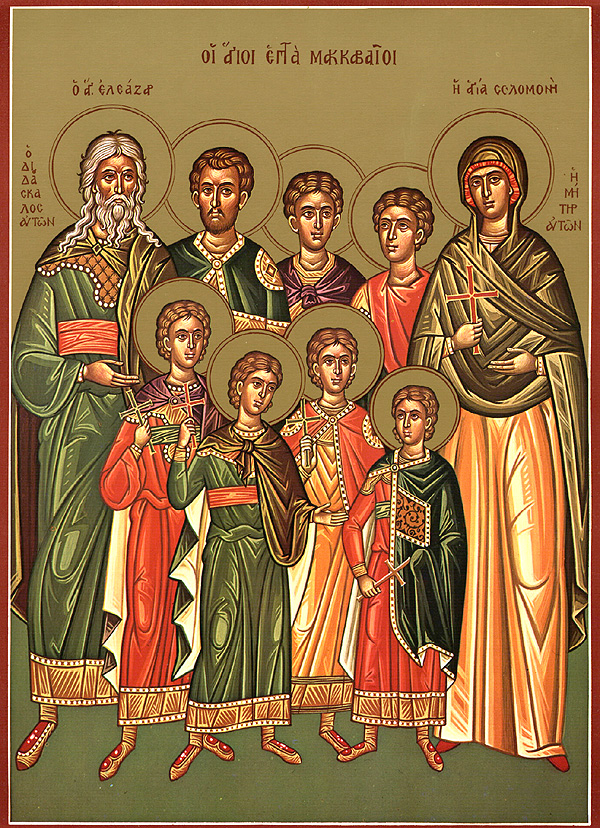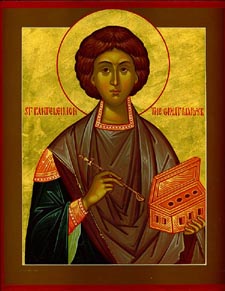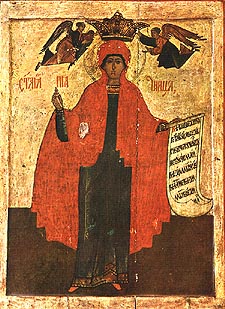 On this day two feasts are celebrated: 1) the Procession, that is, bringing out of the Honorable Wood of the Honorable and Life-Giving Cross of the Lord, and 2) the celebration of the All-Merciful Savior Christ God and His Mother the Most Holy Theotokos, Mary. This is a minor feast. In Constantinople, during the time of the Greek emperors, on August 1 the Life-Giving Cross was carried out of the palace to the Church of the Hagia Sophia, and there was a blessing of the waters. This custom came to Russia from Greece. On this day after the Liturgy a small blessing of the waters in performed to bless the rivers, ponds, and lakes, and people process to these places from the church. The lesser blessing of the waters differs from the great, Theophany blessing of the waters in that hymns are chanted during the procession, and in that the prayers for the water blessing are shorter. Also, during the immersion of the cross into the water, "Save O Lord Thy people..." is sung, rather than "When Thou O Lord wast baptized in the Jordan."
On this day two feasts are celebrated: 1) the Procession, that is, bringing out of the Honorable Wood of the Honorable and Life-Giving Cross of the Lord, and 2) the celebration of the All-Merciful Savior Christ God and His Mother the Most Holy Theotokos, Mary. This is a minor feast. In Constantinople, during the time of the Greek emperors, on August 1 the Life-Giving Cross was carried out of the palace to the Church of the Hagia Sophia, and there was a blessing of the waters. This custom came to Russia from Greece. On this day after the Liturgy a small blessing of the waters in performed to bless the rivers, ponds, and lakes, and people process to these places from the church. The lesser blessing of the waters differs from the great, Theophany blessing of the waters in that hymns are chanted during the procession, and in that the prayers for the water blessing are shorter. Also, during the immersion of the cross into the water, "Save O Lord Thy people..." is sung, rather than "When Thou O Lord wast baptized in the Jordan."
Dormition of the Theotokos
 The feast of the Dormition or Falling-asleep of the Theotokos is celebrated on the fifteenth of August, preceded by a two-week fast. This feast, which is also sometimes called the Assumption, commemorates the death, resurrection and glorification of Christ’s mother. It proclaims that Mary has been “assumed” by God into the heavenly kingdom of Christ in the fullness of her spiritual and bodily existence.
The feast of the Dormition or Falling-asleep of the Theotokos is celebrated on the fifteenth of August, preceded by a two-week fast. This feast, which is also sometimes called the Assumption, commemorates the death, resurrection and glorification of Christ’s mother. It proclaims that Mary has been “assumed” by God into the heavenly kingdom of Christ in the fullness of her spiritual and bodily existence.
As with the nativity of the Virgin and the feast of her entrance to the temple, there are no biblical or historical sources for this feast. The Tradition of the Church is that Mary died as all people die, not “voluntarily” as her Son, but by the necessity of her mortal human nature which is indivisibly bound up with the corruption of this world.
7 Holy Maccabee Martyrs
 The seven holy Maccabee martyrs Abim, Antonius, Gurias, Eleazar, Eusebonus, Alimus and Marcellus, their mother Solomonia and their teacher Eleazar suffered in the year 166 before Christ under the impious Syrian king Antiochus IV Epiphanes. This foolish ruler loved pagan and Hellenistic customs, and held Jewish customs in contempt. He did everything possible to turn people from the Law of Moses and from their covenant with God. He desecrated the Temple of the Lord, placed a statue of the pagan god Zeus there, and forced the Jews to worship it. Many people abandoned the God of Abraham, Isaac, and Jacob, but there were also those who continued to believe that the Savior would come.
The seven holy Maccabee martyrs Abim, Antonius, Gurias, Eleazar, Eusebonus, Alimus and Marcellus, their mother Solomonia and their teacher Eleazar suffered in the year 166 before Christ under the impious Syrian king Antiochus IV Epiphanes. This foolish ruler loved pagan and Hellenistic customs, and held Jewish customs in contempt. He did everything possible to turn people from the Law of Moses and from their covenant with God. He desecrated the Temple of the Lord, placed a statue of the pagan god Zeus there, and forced the Jews to worship it. Many people abandoned the God of Abraham, Isaac, and Jacob, but there were also those who continued to believe that the Savior would come.
A ninety-year-old elder, the scribe and teacher Eleazar, was brought to trial for his faithfulness to the Mosaic Law. He suffered tortures and died at Jerusalem.
On the feast of the Procession of Honorable Wood of the Honorable and Life-Giving Cross of the Lord
Greatmartyr and Healer Panteleimon
 The Great Martyr and Healer Panteleimon was born in the city of Nicomedia into the family of the illustrious pagan Eustorgius, and he was named Pantoleon. His mother Saint Euboula (March 30) was a Christian. She wanted to raise her son in the Christian Faith, but she died when the future martyr was just a young child. His father sent Pantoleon to a pagan school, after which the young man studied medicine at Nicomedia under the renowned physician Euphrosynus. Pantoleon came to the attention of the emperor Maximian (284-305), who wished to appoint him as royal physician when he finished his schooling.
The Great Martyr and Healer Panteleimon was born in the city of Nicomedia into the family of the illustrious pagan Eustorgius, and he was named Pantoleon. His mother Saint Euboula (March 30) was a Christian. She wanted to raise her son in the Christian Faith, but she died when the future martyr was just a young child. His father sent Pantoleon to a pagan school, after which the young man studied medicine at Nicomedia under the renowned physician Euphrosynus. Pantoleon came to the attention of the emperor Maximian (284-305), who wished to appoint him as royal physician when he finished his schooling.
The hieromartyrs Hermolaus, Hermippus and Hermocrates, survivors of the massacre of 20,000 Christians in 303 (December 28), were living secretly in Nicomedia at that time. Saint Hermolaus saw Pantoleon time and again when he came to the house where they were hiding. Once, the priest invited the youth to the house and spoke about the Christian Faith. After this Pantoleon visited Saint Hermolaus every day.
Martyr Parasceva of Rome
 Holy Virgin Martyr Paraskeva of Rome was the only daughter of Christian parents, Agathon and Politia, and from her early years she dedicated herself to God. She spent much of her time in prayer and the study of the Holy Scriptures. After the death of her parents Saint Paraskeva distributed all of her inheritance to the poor, and consecrated her virginity to Christ. Emulating the holy Apostles, she began to preach to the pagans about Christ, converting many to Christianity.
Holy Virgin Martyr Paraskeva of Rome was the only daughter of Christian parents, Agathon and Politia, and from her early years she dedicated herself to God. She spent much of her time in prayer and the study of the Holy Scriptures. After the death of her parents Saint Paraskeva distributed all of her inheritance to the poor, and consecrated her virginity to Christ. Emulating the holy Apostles, she began to preach to the pagans about Christ, converting many to Christianity.
She was arrested during the reign of Antoninus Pius (138-161) because she refused to worship the idols. She was brought to trial and fearlessly confessed herself a Christian. Neither enticements of honors and material possessions, nor threats of torture and death shook the firmness of the saint nor turned her from Christ. She was given over to beastly tortures. They put a red-hot helmet on her head and threw her in a cauldron filled with boiling oil and pitch. By the power of God the holy martyr remained unharmed. When the emperor peered into the cauldron, Saint Paraskeva threw a drop of the hot liquid in his face, and he was burned. The emperor began to ask her for help, and the holy martyr healed him. After this the emperor set her free.

